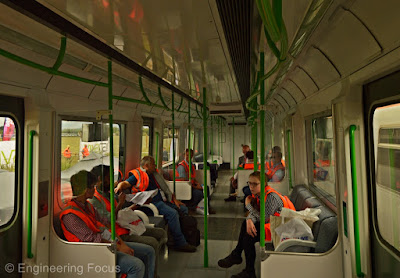RailLive special - A busy year for Vivarail (part 2)
Battery trains
In part one I wrote about the class 230 trains which have been ordered for the Wales and Borders franchise and for West Midlands Railway. But that's not all that has been happening at Vivarail over the past year. The engineering team has also been busy developing a battery-powered variant which has already carried its first passengers, all be it on a short run at Long Marston.
I was lucky enough to be amongst those to ride the train at RailLive 2018 along the 200 metres or so of track used to demonstrate the unit. The ride was smooth and quiet as you would expect from an all-electric vehicle, but with such a short section of track I wasn't able to get a feeling of performance. However what I could appreciate was how advanced the development was, this wasn't an unfinished prototype, it felt like a train that could already be working passenger services.
It will be possible to charge the batteries through existing infrastructure such as overhead lines, 3rd rail or with static battery banks on non-electrified lines. In each case the train will be charged via a patented automatic charging point.
In part one I wrote about the class 230 trains which have been ordered for the Wales and Borders franchise and for West Midlands Railway. But that's not all that has been happening at Vivarail over the past year. The engineering team has also been busy developing a battery-powered variant which has already carried its first passengers, all be it on a short run at Long Marston.
I was lucky enough to be amongst those to ride the train at RailLive 2018 along the 200 metres or so of track used to demonstrate the unit. The ride was smooth and quiet as you would expect from an all-electric vehicle, but with such a short section of track I wasn't able to get a feeling of performance. However what I could appreciate was how advanced the development was, this wasn't an unfinished prototype, it felt like a train that could already be working passenger services.
Vivarail engineers have developed a modular system which uses rafts to house the batteries similar to the system used for the diesel engines, they can be swapped relatively easily and a number of rafts can be installed under each carriage. The 2 car test train has 4 rafts each providing 106kwh, but more rafts can be added.
It will be possible to charge the batteries through existing infrastructure such as overhead lines, 3rd rail or with static battery banks on non-electrified lines. In each case the train will be charged via a patented automatic charging point.
The image above shows one of the battery rafts which as well as providing power for the train can also be used to provide static charging points. Rather than relying on local services, a raft or number of rafts could be placed at railway stations to provide additional charging further increasing the range of the train.
Vivarail hasn't released any figures on range yet, however it is thought that a 3 car battery unit could achieve a range of 80 miles and with new battery technology this will improve still further.
Hybrid trains
The battery technology that has been developed isn't just being used to power all-electric units, the technology will also be used on the class 230 diesel-electric units destined for Wales and Borders. Hybrid technology will be used to further improve the environmental credentials and reduce operating cost of the diesel units by saving fuel.
Each class 230 will be fitted with 4 battery rafts, 2 underneath each of the driving cars, the diesel engines will be placed underneath the middle carriage and will be used to charge the batteries. This system will provide quicker acceleration whilst improving fuel economy through the use of regenerative braking and GPS controlled engine management.
The engines will be controlled by a GPS system which will be able to switch the engines off when they are not required, or at stations where there may be environmental concerns. This system combined with regenerative breaking promises to deliver a 20% fuel saving compared to a unit powered by diesel engines alone.
I have uploaded a short clip to Youtube of the battery train in action.
Apologies about the sound, it was a windy day in Warwickshire
I hope to provide further updates on the development of the battery train and deployment of the units that have been ordered in the not too distant future.





Comments
Post a Comment